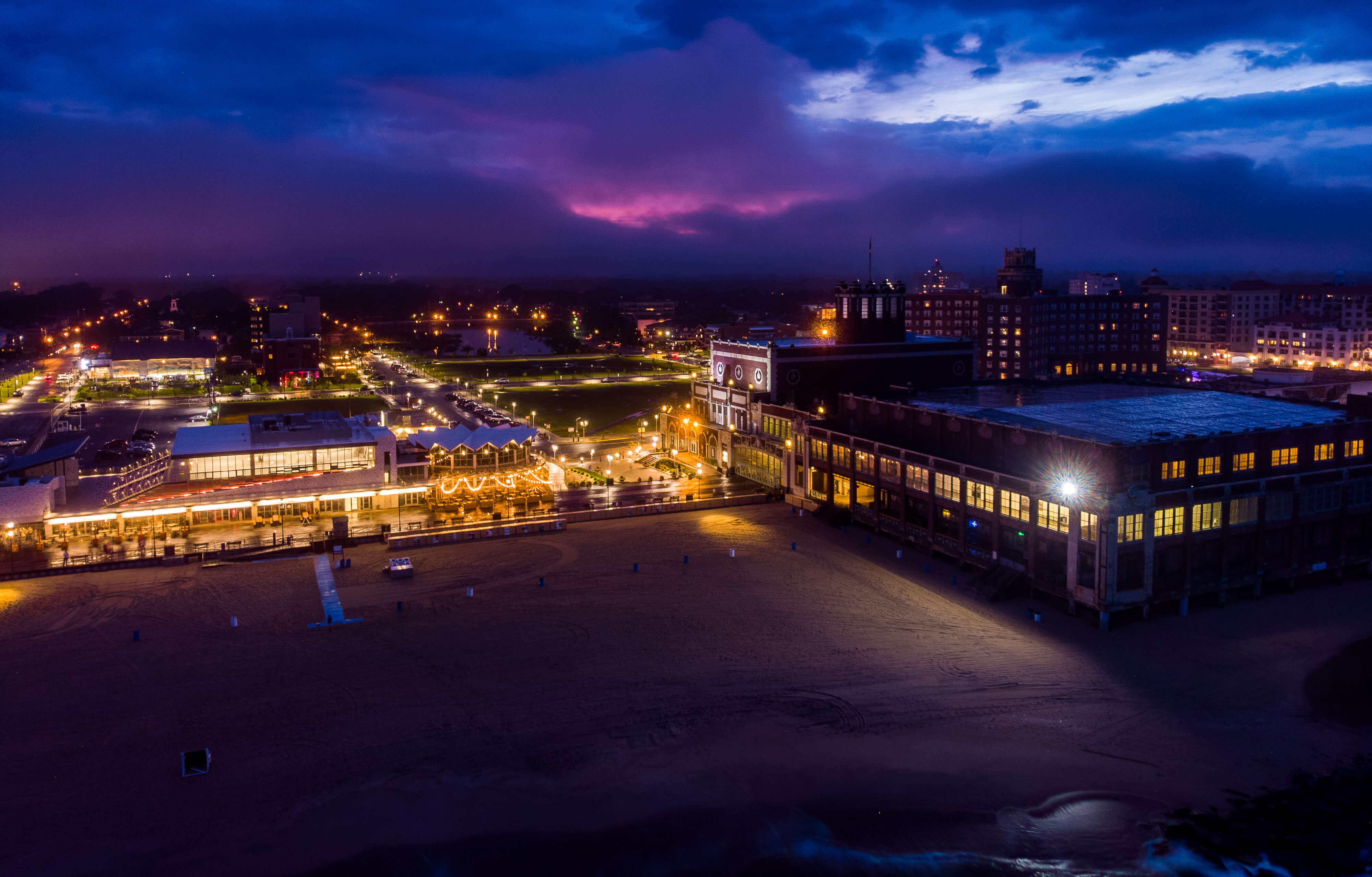
The Urban Coast Institute (UCI) has awarded Heidi Lynn Sculthorpe Faculty Enrichment Grants for projects that will create Little Free Library installations in low-income coastal communities and study COVID-19’s impacts on the African American community in Asbury Park, New Jersey.
In light of the continuing crises of the COVID-19 pandemic and concern about systemic racism, the UCI issued a special call for proposals in August to support faculty and student research and community-based projects focused on sustainably rebuilding our coastal communities and economies while addressing disproportional impacts to and needs of our most vulnerable populations. The call noted that environmental justice communities, including those of low income, communities of color, immigrant groups, and Indigenous peoples are disproportionately vulnerable to the environmental and health impacts of climate change and COVID-19.
The following are summaries of the two grant-funded projects. Both are currently underway.
Nourishing Book Deserts: Providing Access to Authentic and Relevant Interdisciplinary and Inclusive Books for Coastal Communities
Faculty Researchers: Kenneth Kunz, Jason Fitzgerald and Michelle Schpakow, Department of Curriculum and Instruction; Kurt Wagner, Monmouth University librarian; and Lori Burns, Department of Educational Counseling and Leadership
This project aims to counter the limited availability of books in the home in low-income coastal communities, an issue which has been exacerbated by virtual schooling and children’s reduced access to school libraries. Faculty researchers and students from the School of Education will initiate a process for local school districts to apply for the installation of Little Free Libraries in their communities. The grant will cover the purchase of texts and the materials to build the physical libraries, which will be designed by Monmouth University artists. Reading materials in the libraries will be coastal-relevant, interdisciplinary and inclusive to tackle the complex challenges facing their locations.
Paradoxical Paradise: Asbury Park, an African American Oral History and Mapping Project
Faculty Researchers: Hettie V. Williams, Geoffrey Fouad and Melissa Ziobro, Department of History and Anthropology
“Paradoxical Paradise” is a multiyear and multidisciplinary research, oral history and digital mapping project that seeks to document and preserve the African American history of Asbury Park. The grant will fund a phase of the project focused on COVID-19 and the experience of African Americans in the city as it relates to health disparities. Activities will include archival research led by Williams (with an emphasis on drawing parallels between the 1918 influenza pandemic and COVID-19); student interviews with residents guided by Ziobro; and the creation of GIS map products by Fouad and students that visualize COVID-19 health statistics in the area and the pandemic’s impacts on African Americans.
About the Program
The Heidi Lynn Sculthorpe Scholars program offers grant opportunities to students and faculty of all disciplines whose work advances core elements of Monmouth’s Strategic Plan and supports the UCI’s mission. The program is funded through the generosity of many corporate and private donors. If you would like to make a tax-deductible gift to the UCI, please click here. For more information, contact UCI Associate Director Tom Herrington at therring@monmouth.edu.

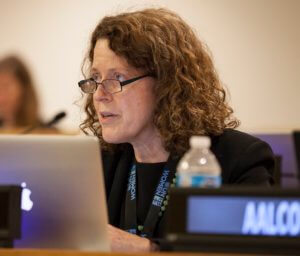 Cymie R. Payne is an associate professor at Rutgers University. She holds a joint appointment in the Department of Human Ecology and at Rutgers Law School. Professor Payne has appeared as counsel before the International Tribunal for the Law of the Sea in its deep seabed mining and fisheries advisory opinion cases. Currently, she is legal advisor to International Union for Conservation of Nature’s delegation to the intergovernmental conference for a legally binding agreement on conservation and sustainable use of biological diversity in areas beyond national jurisdiction and chair of the IUCN World Commission on Environmental, Ocean Coasts and Coral Reefs Specialist Group. She has also been a member of the Berkeley Law faculty and served as an attorney with the U.S. Department of the Interior, the law firm of Goodwin, Procter and the U.N. Security Council’s environmental war reparations program. Professor Payne holds a M.A. from The Fletcher School of Law and Diplomacy and a J.D. from the University of California, Berkeley.
Cymie R. Payne is an associate professor at Rutgers University. She holds a joint appointment in the Department of Human Ecology and at Rutgers Law School. Professor Payne has appeared as counsel before the International Tribunal for the Law of the Sea in its deep seabed mining and fisheries advisory opinion cases. Currently, she is legal advisor to International Union for Conservation of Nature’s delegation to the intergovernmental conference for a legally binding agreement on conservation and sustainable use of biological diversity in areas beyond national jurisdiction and chair of the IUCN World Commission on Environmental, Ocean Coasts and Coral Reefs Specialist Group. She has also been a member of the Berkeley Law faculty and served as an attorney with the U.S. Department of the Interior, the law firm of Goodwin, Procter and the U.N. Security Council’s environmental war reparations program. Professor Payne holds a M.A. from The Fletcher School of Law and Diplomacy and a J.D. from the University of California, Berkeley.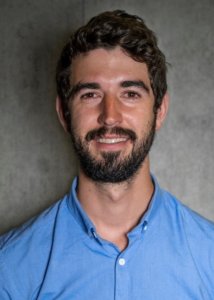 Dr. Guillermo Ortuño Crespo is a marine ecologist with a master of science from the University of St. Andrews in ecosystem-based management of marine systems and a doctorate in marine science and conservation from Duke University. Ortuño Crespo specializes in the spatial ecology patterns of distribution of both pelagic species (such as tuna, billfish and sharks) and that of pelagic fisheries (including purse seines and longliners) to identify areas of high risk and opportunity for sustainable fishing in the open ocean. He has been an active participant in the ongoing high seas BBNJ negotiations highlighting the importance of improving fisheries management beyond national jurisdiction through more transparent operations and a wider use of spatial management tools to reduce bycatch. Throughout his postdoc at the Stockholm Resilience Centre he will be working on a novel spatial management study in collaboration with the Inter-American Tropical Tuna Commission (IATTC) to develop the first ever tuna-RFMO dynamic spatial management strategy. As part of his commitment to the U.N. Decade of Ocean Science, Ortuño Crespo is facilitating the conversation on corporate sustainability among early career professionals with the ultimate objective of fostering strong relationships between upcoming science, conservation or technology young leaders and those companies which show determination in leading the way towards a more sustainable future.
Dr. Guillermo Ortuño Crespo is a marine ecologist with a master of science from the University of St. Andrews in ecosystem-based management of marine systems and a doctorate in marine science and conservation from Duke University. Ortuño Crespo specializes in the spatial ecology patterns of distribution of both pelagic species (such as tuna, billfish and sharks) and that of pelagic fisheries (including purse seines and longliners) to identify areas of high risk and opportunity for sustainable fishing in the open ocean. He has been an active participant in the ongoing high seas BBNJ negotiations highlighting the importance of improving fisheries management beyond national jurisdiction through more transparent operations and a wider use of spatial management tools to reduce bycatch. Throughout his postdoc at the Stockholm Resilience Centre he will be working on a novel spatial management study in collaboration with the Inter-American Tropical Tuna Commission (IATTC) to develop the first ever tuna-RFMO dynamic spatial management strategy. As part of his commitment to the U.N. Decade of Ocean Science, Ortuño Crespo is facilitating the conversation on corporate sustainability among early career professionals with the ultimate objective of fostering strong relationships between upcoming science, conservation or technology young leaders and those companies which show determination in leading the way towards a more sustainable future.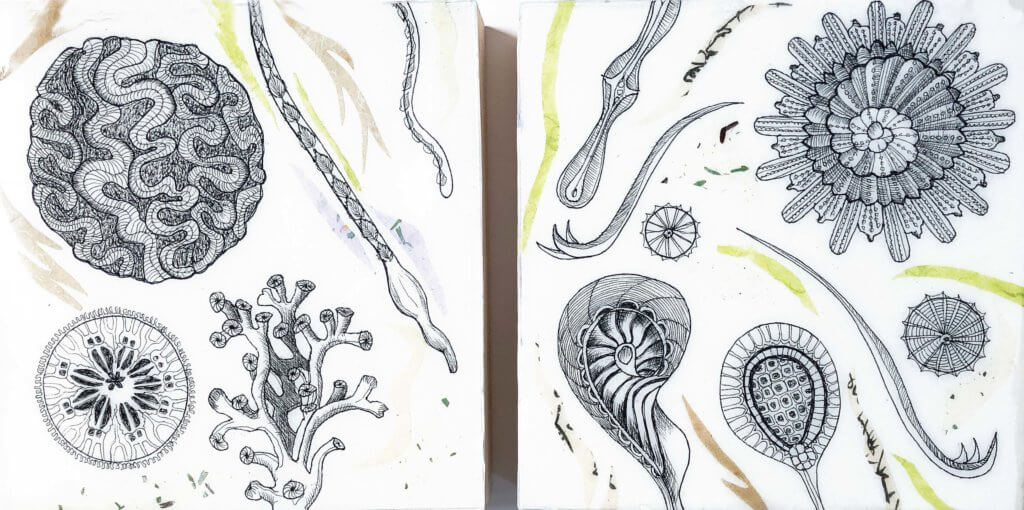
 Count among them Monmouth University Professor Pat Cresson, who recently created over 50 works highlighting both microscopic marine organisms and larger sea creatures. Cresson presented her collection, The Interface Between Marine Biology and Creative Microscopic Inhabitants of the Sea, in a
Count among them Monmouth University Professor Pat Cresson, who recently created over 50 works highlighting both microscopic marine organisms and larger sea creatures. Cresson presented her collection, The Interface Between Marine Biology and Creative Microscopic Inhabitants of the Sea, in a 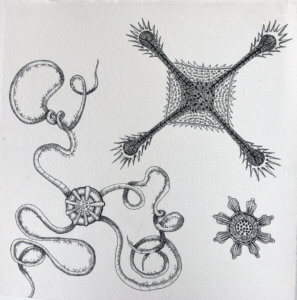 Cresson’s first works in the collection were detailed black ink drawings on heavy white watercolor paper. She then began creating a series of illustrations on deep wood panels that were covered with glued drawings on paper. Then an epoxy surface was poured over these panels, sometimes stained blue or green giving the appearance that they were submerged under water. She also created several collages on paper adhered to wood panels depicting ocean scenes. (Scroll to gallery below to view samples of her works.) Materials for the project were purchased through a faculty enrichment grant awarded via the Urban Coast Institute’s
Cresson’s first works in the collection were detailed black ink drawings on heavy white watercolor paper. She then began creating a series of illustrations on deep wood panels that were covered with glued drawings on paper. Then an epoxy surface was poured over these panels, sometimes stained blue or green giving the appearance that they were submerged under water. She also created several collages on paper adhered to wood panels depicting ocean scenes. (Scroll to gallery below to view samples of her works.) Materials for the project were purchased through a faculty enrichment grant awarded via the Urban Coast Institute’s 


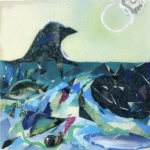




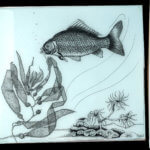


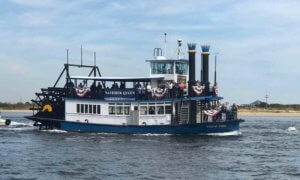 Come rolling on the rivers and bays with Capt. Dan Schade and his old-time paddle wheeler, the Navesink Queen, in the latest edition of the Mid-Atlantic Ocean Data Portal’s “Ocean Stories” series, created by UCI Communications Director Karl Vilacoba. The story and its interactive data maps provide a snapshot of life navigating the crowded waters of the Navesink and Shrewsbury rivers and Sandy Hook and Raritan bays aboard his fleet of classic boats.
Come rolling on the rivers and bays with Capt. Dan Schade and his old-time paddle wheeler, the Navesink Queen, in the latest edition of the Mid-Atlantic Ocean Data Portal’s “Ocean Stories” series, created by UCI Communications Director Karl Vilacoba. The story and its interactive data maps provide a snapshot of life navigating the crowded waters of the Navesink and Shrewsbury rivers and Sandy Hook and Raritan bays aboard his fleet of classic boats. 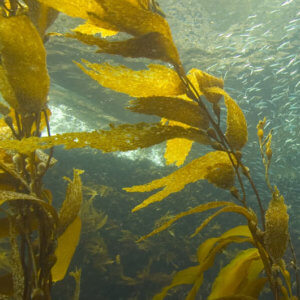 The Urban Coast Institute’s Marine & Environmental Speaker Series returns Nov. 10 from noon to 1 p.m. with “Is Seaweed a Fish?” by Ethan Prall, Esq. The talk is free and open to the public. Upon registration, attendees will receive an email with the Zoom link for the event.
The Urban Coast Institute’s Marine & Environmental Speaker Series returns Nov. 10 from noon to 1 p.m. with “Is Seaweed a Fish?” by Ethan Prall, Esq. The talk is free and open to the public. Upon registration, attendees will receive an email with the Zoom link for the event.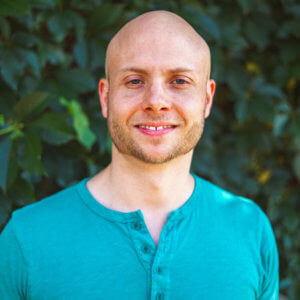 Ethan Prall, Esq. is an environmental lawyer and policy advocate at the law firm Latham & Watkins LLP, in Washington, DC. He represents clients on a variety of domestic and international environmental and clean energy law and policy, including: creating the government for a new clean energy zone overseas, offshore wind energy permitting, Endangered Species Act consultations, and litigating against the Trump Administration’s rollback of California’s vehicle emissions standards. His scholarly work focuses on addressing the global challenges posed by anthropogenic change on natural systems, such as climate change and biodiversity loss. His latest publication, forthcoming Spring 2021, focuses on U.S. federal regulation of seaweed farming as a potential climate change mitigation tool. He holds a B.A. from Texas A&M University, an M.T.S. from Duke University, and a J.D. from Harvard Law School.
Ethan Prall, Esq. is an environmental lawyer and policy advocate at the law firm Latham & Watkins LLP, in Washington, DC. He represents clients on a variety of domestic and international environmental and clean energy law and policy, including: creating the government for a new clean energy zone overseas, offshore wind energy permitting, Endangered Species Act consultations, and litigating against the Trump Administration’s rollback of California’s vehicle emissions standards. His scholarly work focuses on addressing the global challenges posed by anthropogenic change on natural systems, such as climate change and biodiversity loss. His latest publication, forthcoming Spring 2021, focuses on U.S. federal regulation of seaweed farming as a potential climate change mitigation tool. He holds a B.A. from Texas A&M University, an M.T.S. from Duke University, and a J.D. from Harvard Law School.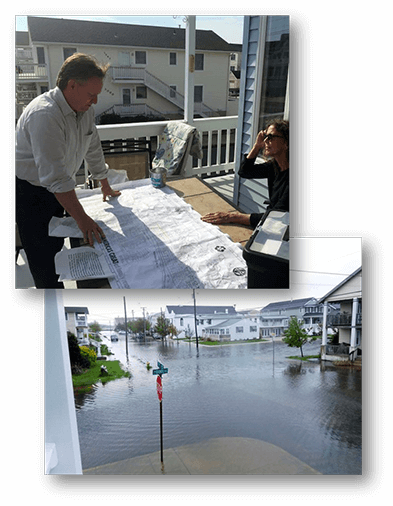 The award was presented during the Mid-Atlantic Sea Grant Region’s annual meeting, held virtually in October. Herrington serves as the
The award was presented during the Mid-Atlantic Sea Grant Region’s annual meeting, held virtually in October. Herrington serves as the 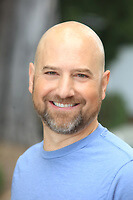 Dr. Jason Scorse completed his Ph.D. in Agricultural and Natural Resource Economics at UC-Berkeley in 2005 with a focus on environmental economics and policy, international development, and behavioral economics. Upon graduation, he became a full-time faculty member of the Middlebury Institute of International Studies at Monterey. Professor Scorse teaches courses in environmental and natural resource economics, ocean and coastal economics, and behavioral economics. In 2009, he was promoted to the Chair of the International Environmental Policy Program, and in 2011, he became the Director of the Center for the Blue Economy, which provides “leadership in research, education, and analysis to promote a sustainable ocean and coastal economy.” Professor Scorse’s book, What Environmentalists Need to Know About Economics, was published by Palgrave Macmillan in 2010. In his spare time, Professor Scorse longboards, cooks gourmet vegan food, and writes fiction for when he starts his new career after we’ve solved all of the world’s great environmental challenges.
Dr. Jason Scorse completed his Ph.D. in Agricultural and Natural Resource Economics at UC-Berkeley in 2005 with a focus on environmental economics and policy, international development, and behavioral economics. Upon graduation, he became a full-time faculty member of the Middlebury Institute of International Studies at Monterey. Professor Scorse teaches courses in environmental and natural resource economics, ocean and coastal economics, and behavioral economics. In 2009, he was promoted to the Chair of the International Environmental Policy Program, and in 2011, he became the Director of the Center for the Blue Economy, which provides “leadership in research, education, and analysis to promote a sustainable ocean and coastal economy.” Professor Scorse’s book, What Environmentalists Need to Know About Economics, was published by Palgrave Macmillan in 2010. In his spare time, Professor Scorse longboards, cooks gourmet vegan food, and writes fiction for when he starts his new career after we’ve solved all of the world’s great environmental challenges.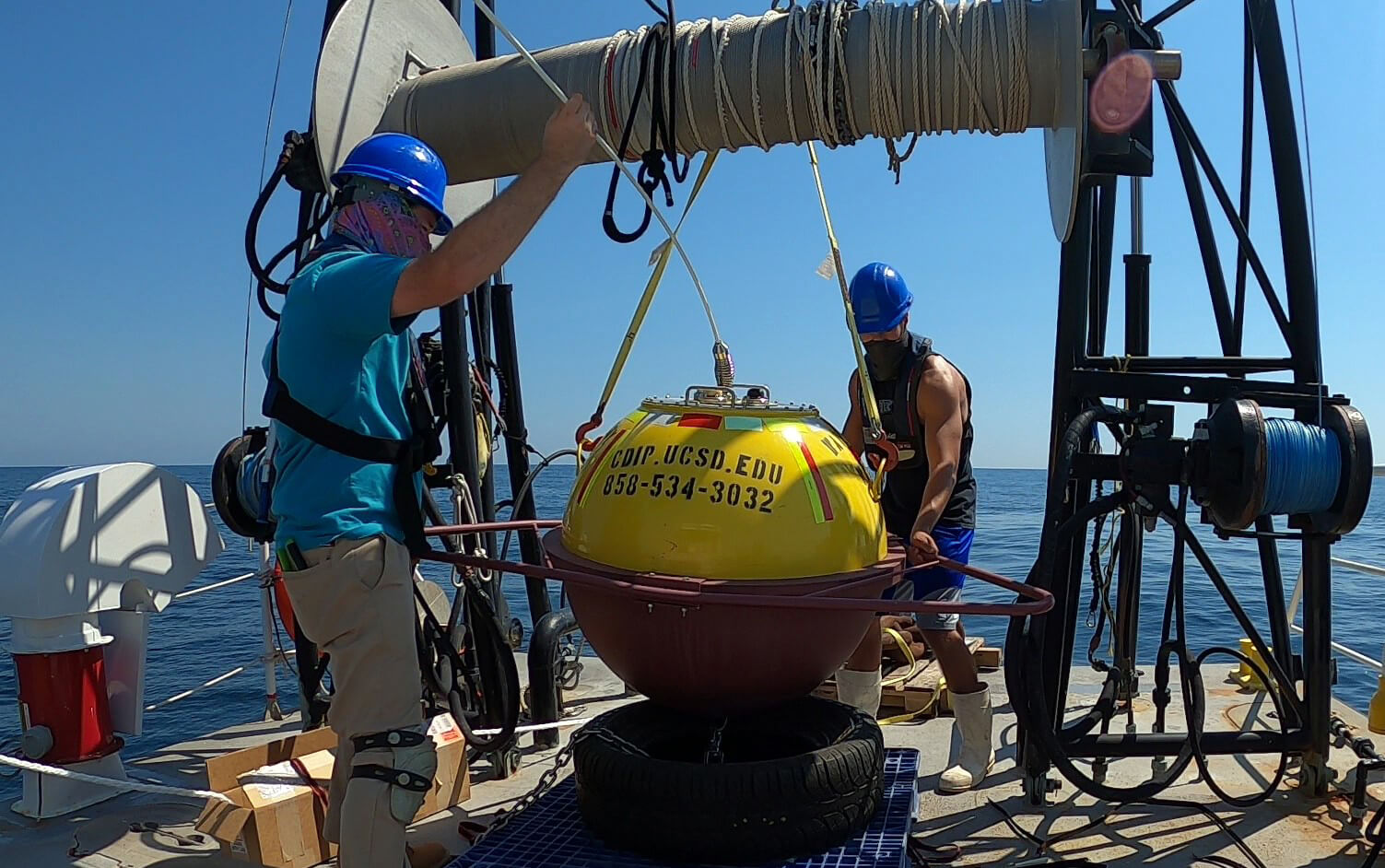
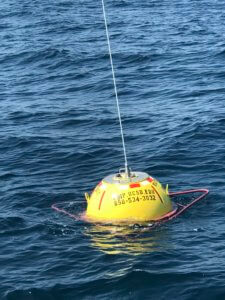 “The Jersey Shore sees very different wave fields than, say, North Carolina or even Delaware because Long Island Sound, Long Island itself and New England act as a natural breakwater for waves coming from the northeast,” Herrington said. “So the wave climate we have off New York Harbor is very different than the wave climate we have off Cape May. This buoy is really important to understanding what’s going on off our coast.”
“The Jersey Shore sees very different wave fields than, say, North Carolina or even Delaware because Long Island Sound, Long Island itself and New England act as a natural breakwater for waves coming from the northeast,” Herrington said. “So the wave climate we have off New York Harbor is very different than the wave climate we have off Cape May. This buoy is really important to understanding what’s going on off our coast.”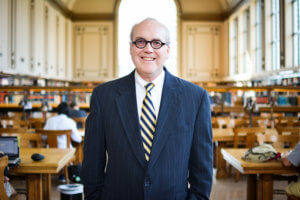 Dr. Wil Burns is a Professor of Research and Founding Co-Executive Director of the
Dr. Wil Burns is a Professor of Research and Founding Co-Executive Director of the